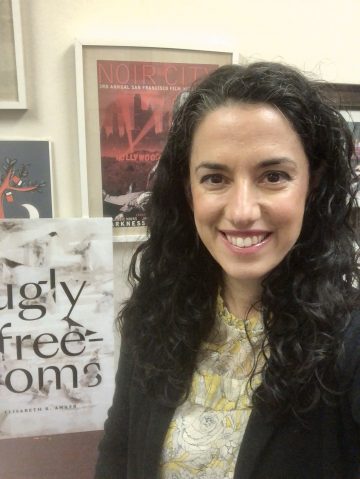Keynote Speakers
“We Go Low”
How might aspirations to freedom that seem debased, inferior, or bad examples actually offer inspiring visions of free action? This talk will explore freedoms found outside expected places like organized social movements, heroic figures of courage, or vaunted revolutionary practices, and identify them with the phrase “We Go Low”. We Go Low is not (only) a challenge to aspirational visions encapsulated in the iconic phrase We Go High, visions of freedom positioned as politically righteous and morally superior to their opponents. We Go High is taken as shorthand for a democratic politics that imagines roads to equality and freedom unstained by the manipulative, sleazy, and norm-upending strategies of one’s opponents. Yet Going High is a block to real emancipatory visions and possibilities, as it refuses impure methods, stymies lived experiences of moral and political ambivalence, and remains within current narrow standards of acceptability that always benefit elites. We Go Low, by contrast, advocates for shared aspirations toward a free and democratic world that willingly traffic in the muck, in the uncivilized, or in spaces of ill repute. This talk will sketch a positive theory of Going Low and examine contemporary aspirations to freedom that take the low road.

Elisabeth Anker is Professor of American Studies and Political Science at George Washington University. She researches formations of power, violence, and freedom at the crossroads of political theory and American culture. She is the author of Ugly Freedoms (Duke, 2022), which won honorable mention for the John Hope Franklin Prize for the Best Book in American Studies, and Orgies of Feeling: Melodrama and the Politics of Freedom (Duke 2014). She currently serves as co-editor of the journal Theory & Event, and she frequently comments on current events for international television.
“Climate Justice Now!”
Climate Justice as Non-Naïve Radical Hope: Aspirations, Conflagrations, Reparations
Scientific forecasts are grim and climate politics at the national level in the US are schlerotic. The US is responsible for 25% of historical carbon emissions since 1750. The US military and its 800 military bases around the world, are the single largest institutional emitter of carbon, larger than the country of Sweden. The apocalyptic politics of doom, among some segments of younger peoples loom large. At the same time, broader publics are aware and engaged in climate politics, that range in their politics from reformist to radical. How can we make sense of climate injustice, and climate justice, from the standpoint of American Studies (and allied fields)? This talk explores climate justice as a politics of non-naïve radical hope, drawing on 30+ years of engaged scholarship with environmental justice movements (in New York and California). Specifically, I focus on the role of cultural production in climate justice movements, as a response to conflagrations. These conflagrations (“burning”) are “climate-focused” and “system-focused,” i.e. in anti police-brutality movements that exploded in 2020 during the convergence of COVID and wildfires. I focus on how communities disempowered by existing economic and political systems have been leading the charge on climate justice, by foregrounding reparative and regenerative politics as anti-extraction. Climate justice foregrounds community-based (“frontline”) perspectives that are significant in cultural and political terms. This talk explores how aspirations and hopes frames climate justice in our collective and differentiated moment of danger.

Julie Sze is Professor of American Studies and the Founding Director of the Environmental Justice Project at UC Davis. She has authored 3 books (Noxious New York: The Racial Politics of Urban Health and Environmental Justice, Fantasy Islands: Chinese Dreams and Ecological Fears in an Age of Climate Crisis and most recently in 2020, Environmental Justice in a Moment of Danger). She edited Sustainability: Approaches to Environmental Justice and Social Power (2018) and has written over 65 articles and book chapters and actively works in interdisciplinary collaborations and with community-based organizers in California and New York.
